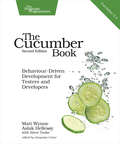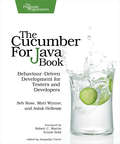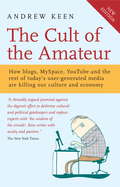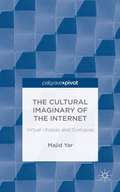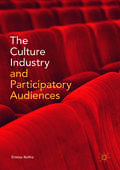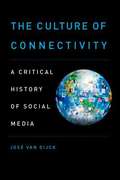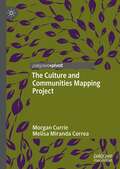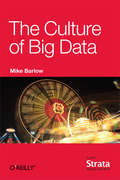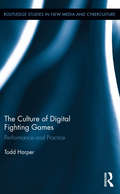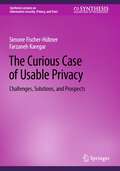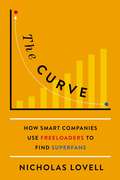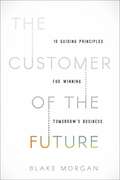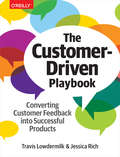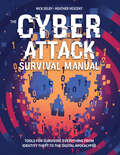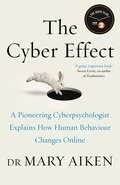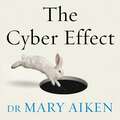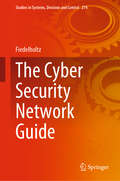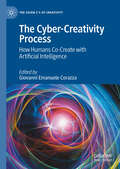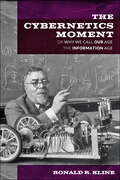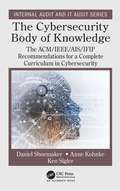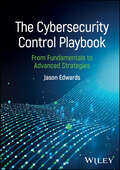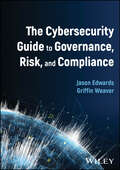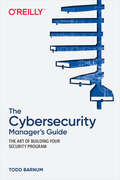- Table View
- List View
The Cucumber Book: Behaviour-Driven Development for Testers and Developers
by Matt Wynne Aslak Hellesoy Steve TookeYour customers want rock-solid, bug-free software that does exactly what they expect it to do. Yet they can't always articulate their ideas clearly enough for you to turn them into code. You need Cucumber: a testing, communication, and requirements tool-all rolled into one. All the code in this book is updated for Cucumber 2.4, Rails 5, and RSpec 3.5. Express your customers' wild ideas as a set of clear, executable specifications that everyone on the team can read. Feed those examples into Cucumber and let it guide your development. Build just the right code to keep your customers happy. You can use Cucumber to test almost any system or any platform. Get started by using the core features of Cucumber and working with Cucumber's Gherkin DSL to describe-in plain language-the behavior your customers want from the system. Then write Ruby code that interprets those plain-language specifications and checks them against your application. Next, consolidate the knowledge you've gained with a worked example, where you'll learn more advanced Cucumber techniques, test asynchronous systems, and test systems that use a database. Recipes highlight some of the most difficult and commonly seen situations the authors have helped teams solve. With these patterns and techniques, test Ajax-heavy web applications with Capybara and Selenium, REST web services, Ruby on Rails applications, command-line applications, legacy applications, and more. Written by the creator of Cucumber and the co-founders of Cucumber Ltd., this authoritative guide will give you and your team all the knowledge you need to start using Cucumber with confidence. What You Need: Windows, Mac OS X (with XCode) or Linux, Ruby 1.9.2 and upwards, Cucumber 2.4, Rails 5, and RSpec 3.5
The Cucumber for Java Book: Behaviour-Driven Development for Testers and Developers
by Matt Wynne Aslak Hellesoy Seb RoseTeams working on the JVM can now say goodbye forever to misunderstood requirements, tedious manual acceptance tests, and out-of-date documentation. Cucumber - the popular, open-source tool that helps teams communicate more effectively with their customers - now has a Java version, and our bestselling Cucumber Book has been updated to match. The Cucumber for Java Book has the same great advice about how to deliver rock-solid applications collaboratively, but with all code completely rewritten in Java. New chapters cover features unique to the Java version of Cucumber, and reflect insights from the Cucumber team since the original book was published.Until now it's been difficult for teams developing Java applications to learn how to benefit from Behaviour-Driven Development (BDD). This book changes all that by describing in detail how to use Cucumber to harness the power of plain language specifications in your development process.In part 1, you'll discover how to use Cucumber's Gherkin DSL to describe the behavior your customers want from the system. You'll also learn how to write Java code that interprets those plain language specifications and checks them against your application. Part 2 guides you through a worked example, using Spring, MySQL, and Jetty. Enhanced chapters teach you how to use Selenium to drive your application and handle asynchronous Ajax calls, and new chapters cover Dependency Injection (DI) and advanced techniques to help keep your test suites fast. Part 3 shows you how to integrate Cucumber with your Continuous Integration (CI) system, work with a REST web service, and even use BDD with legacy applications.Written by the creator of Cucumber and two of its most experienced users and contributors, The Cucumber for Java Book is an authoritative guide that will give you and your team all the knowledge you need to start using Cucumber with confidence.
The Cult of Mac, 2nd Edition
by Leander Kahney David PieriniIt's been nearly fifteen years since Apple fans raved over the first edition of the critically-acclaimed The Cult of Mac. This long-awaited second edition brings the reader into the world of Apple today while also filling in the missing history since the 2004 edition, including the creation of Apple brand loyalty, the introduction of the iPhone, and the death of Steve Jobs.Apple is a global luxury brand whose products range from mobile phones and tablets to streaming TVs and smart home speakers. Yet despite this dominance, a distinct subculture persists, which celebrates the ways in which Apple products seem to encourage self-expression, identity, and innovation.The beautifully designed second edition of The Cult of Mac takes you inside today's Apple fandom to explore how devotions--new and old--keep the fire burning. Join journalists Leander Kahney and David Pierini as they explore how enthusiastic fans line up for the latest product releases, and how artists pay tribute to Steve Jobs' legacy in sculpture and opera. Learn why some photographers and filmmakers have eschewed traditional gear in favor of iPhone cameras. Discover a community of collectors around the world who spend tens of thousands of dollars to buy, restore, and enshrine Apple artifacts, like the Newton MessagePad and Apple II.Whether you're an Apple fan or just a casual observer, this second edition of The Cult of Mac is sure to reveal more than a few surprises, offering an intimate look at some of the most dedicated members in the Apple community.
The Cult of the Amateur: How blogs, MySpace, YouTube and the rest of today's user-generated media are killing our culture and economy
by Andrew KeenA new, updated edition, with a new foreword of Andrew Keen's witty and provocative polemic against the rise of user-generated content and the anything goes standards of much online publishing, which set the blogosphere and media alight on publication. Dubbed the 'anti-christ' of Silicon Valley and a dot-com apostate Andrew Keen is the leading contemporary critic of the Internet. and The Cult of the Amateur is a scathing attack on the mad utopians of Web 2.0 and the wisdom of the crowd. Keen argues that much of the content filling up YouTube, MySpace, and blogs is just an endless digital forest of mediocrity which, unconstrained by professional standards or editorial filters, can alter public debate and manipulate public opinion.
The Cultural Imaginary of the Internet: Virtual Utopias and Dystopias
by Majid YarContemporary culture offer contradictory views of the internet and new media technologies, painting them in extremes of optimistic enthusiasm and pessimistic concern. This book explores such representations, uncovering the roots of our cultural responses to the internet, centred upon a profoundly ambivalent reaction to technological modernity.
The Cultural Logic of Computation
by David GolumbiaAdvocates of computers make sweeping claims for their inherently transformative power: new and different from previous technologies, they are sure to resolve many of our existing social problems, and perhaps even to cause a positive political revolution. In The Cultural Logic of Computation, David Golumbia, who worked as a software designer for more than ten years, confronts this orthodoxy, arguing instead that computers are cultural “all the way down”—that there is no part of the apparent technological transformation that is not shaped by historical and cultural processes, or that escapes existing cultural politics. From the perspective of transnational corporations and governments, computers benefit existing power much more fully than they provide means to distribute or contest it. Despite this, our thinking about computers has developed into a nearly invisible ideology Golumbia dubs “computationalism”—an ideology that informs our thinking not just about computers, but about economic and social trends as sweeping as globalization. Driven by a programmer’s knowledge of computers as well as by a deep engagement with contemporary literary and cultural studies and poststructuralist theory, The Cultural Logic of Computation provides a needed corrective to the uncritical enthusiasm for computers common today in many parts of our culture.
The Culture Industry and Participatory Audiences
by Emma KeltieThis project offers a new critique of participatory media practices. While the concept of participatory culture is often theorised as embodying the possibility of a potentially utopian future of media engagement and participation, this book argues that the culture industry, as it adapts and changes, provides moments of authorised participation that play out under the dominance of the industry. Through a critical recounting of the experience of creating a web series in Australia (with a global audience) outside of the culture industry structures, this book argues participation can take place. It is these platforms that become spaces of controlled access to participatory cultural practices.
The Culture Of Connectivity: A Critical History Of Social Media
by Jose Van DijckSocial media has come to deeply penetrate our lives: Facebook, YouTube, Twitter and many other platforms define many of our daily habits of communication and creative production. The Culture of Connectivity studies the rise of social media in the first decade of the twenty-first century up until 2012, providing both a historical and a critical analysis of the emergence of major platforms in the context of a rapidly changing ecosystem of connective media. Such history is needed to understand how these media have come to profoundly affect our experience of online sociality. The first stage of their development shows a fundamental shift. While most sites started out as amateur-driven community platforms, half a decade later they have turned into large corporations that do not just facilitate user connectedness, but have become global information and data mining companies extracting and exploiting user connectivity. Author and media scholar Jose van Dijck offers an analytical prism to examine techno-cultural as well as socio-economic aspects of this transformation. She dissects five major platforms: Facebook, Twitter, Flickr, YouTube, and Wikipedia. Each of these microsystems occupies a distinct position in the larger ecology of connective media, and yet, their underlying mechanisms for coding interfaces, steering users, and filtering content rely on shared ideological principles. At the level of management and organization, we can also observe striking similarities between these platforms' shifting ownership status, governance strategies, and business models. Reconstructing the premises on which these platforms are built, this study highlights how norms for online interaction and communication gradually changed. "Sharing," "friending," "liking," "following," "trending," and "favoriting" have come to denote online practices imbued with specific technological and economic meanings. This process of normalization, the author argues, is part of a larger political and ideological battle over information control in an online world where everything is bound to become social. Crossing lines of technological, historical, sociological, and cultural inquiry, The Culture of Connectivity will reshape the way we think about interpersonal connection in the digital age.
The Culture and Communities Mapping Project
by Morgan Currie Melisa Miranda CorreaThis book describes three years of work by the Culture and Communities Mapping Project, a research project based in Edinburgh that uses maps as an object of study and also a means to facilitate research. Taking a self-reflexive approach, the book draws on a variety of iterative mapping procedures and visual methodologies, from online virtual tours to photo elicitation, to capture the voices of inhabitants and their distinctive perspectives on the city. The book argues that practices of cultural mapping consist of a research field in and of itself, and it situates this work in relation to other areas of research and practice, including critical cartography, cultural geography, critical GIS, activist mapping and artist maps. The book also offers a range of practical approaches towards using print and web-based maps to give visibility to spaces traditionally left out of city representations but that are important to the local communities that use them. Throughout, the authors reflect critically on how, through the processes of mapping, we create knowledge about space, place, community and culture.
The Culture of Big Data
by Mike BarlowTechnology does not exist in a vacuum. In the same way that a plant needs water and nourishment to grow, technology needs people and process to thrive and succeed. Culture (i.e., people and process) is integral and critical to the success of any new technology deployment or implementation. Big data is not just a technology phenomenon. It has a cultural dimension. It's vitally important to remember that most people have not considered the immense difference between a world seen through the lens of a traditional relational database system and a world seen through the lens of a Hadoop Distributed File System.This paper broadly describes the cultural challenges that accompany efforts to create and sustain big data initiatives in an evolving world whose data management processes are rooted firmly in traditional data warehouse architectures.
The Culture of Digital Fighting Games: Performance and Practice (Routledge Studies in New Media and Cyberculture)
by Todd HarperThis book examines the complex network of influences that collide in the culture of digital fighting games. Players from all over the world engage in competitive combat with one another, forming communities in both real and virtual spaces, attending tournaments and battling online via internet-connected home game consoles. But what is the logic behind their shared playstyle and culture? What are the threads that tie them together, and how does this inform our understanding of competitive gaming, community, and identity? Informed by observations made at one of the biggest fighting game events in the world – the Evolution Series tournament, or "EVO" – and interviews with fighting game players themselves, this book covers everything from the influence of arcade spaces, to the place of gender and ethnicity in the community, to the clash of philosophies over how these games should be played in the first place. In the process, it establishes the role of technology, gameplay, and community in how these players define both themselves and the games that they play.
The Curious Case of Usable Privacy: Challenges, Solutions, and Prospects (Synthesis Lectures on Information Security, Privacy, and Trust)
by Simone Fischer-Hübner Farzaneh KaregarThis book journeys through the labyrinth of usable privacy, a place where the interplay of privacy and Human-Computer Interaction (HCI) reveals a myriad of challenges, solutions, and new possibilities. Establishing a solid understanding of usable privacy research, practices, and challenges, the book illuminates for readers the often shadowy corridors of such a multifaceted domain and offers guidelines and solutions to successfully traverse the challenging maze. The book does not simply focus on data protection or legislative frameworks but also on what it takes for privacy to be safeguarded, understood, embraced, and easily practiced by all. It begins with a thorough exploration of the background of privacy tools and technologies, the evolution of privacy rules and regulations, and the backdrop upon which this narrative unfolds. After establishing this context, its next important focus is the current state and future directions of the field, including thefrontiers of usable privacy research in relation to the Internet of Things (IoT), usability of PETs, and usable privacy for UX and software developers. The book also considers the often-overlooked privacy narratives of marginalized communities and delves into the complexities of user-centric privacy. Readers are provided with a blueprint for addressing these hurdles and establishing pathways for a more privacy-conscious world. The text will be of interest to students studying Computer Science, Information Systems, or Law, as well as researchers and practitioners working in the fields of usable privacy, privacy by design, Privacy-Enhancing Technologies (PETs), or HCI. All will benefit from the book’s central deliberation of a question that echoes through time and technological advancements: why does usable privacy matter?
The Curve
by Nicholas LovellIt's the ultimate business question of our time: How do real companies make money when customers expect (and often get) products for free? There are millions of potential customers in the world. Most of them won't pay anything for your product. But some will pay almost anything. The challenge is to find the latter without wasting time and money on the former. In The Curve, Nicholas Lovell weaves together stories from disparate industries to show how smart companies are solving this puzzle. From video games to pop music to model trains, the Internet helps businesses forge direct relationships with a vast global audience by building communities and offering bespoke products and experiences. In many cases, businesses can win by sharing their product (or a version of their product) for free, allowing it to spread as widely as possible. Eventually, a huge number of freeloaders spread the word to the superfans who value that product the most. And a small number of superfans will love a product so much that they will spend substantial sums of money on it--given the chance. These high-value customers are enough to fuel a profitable business. For example: Nine Inch Nails front man Trent Reznor gave away his album for free to find the 2,500 hardcore fans who wanted the $300 limited ultradeluxe edition. Bigpoint, an independent game developer, released three adventure games to 130 million users--and made 80 percent of its $80 million revenue from just 23,000 users, who spent money to upgrade their game-playing arsenal. King Arthur Flour shares useful recipes and tips on its Web site, enchanting a cult of devoted bakers, many of whom happily travel to its Vermont headquarters for expensive specialty baking classes. This approach doesn't apply just to digital products anymore. With the advent of 3D printing, customization of physical goods is easier and cheap, and companies can truly tailor their offerings to their customers. A doll company can personalize everything from hair color to eye shape, and automakers and technicians can create laser-scanned replacement parts for classic cars. Although the potential for piracy will spread to industries that believed they were immune to such disruption, businesses have an opportunity to make money in this new paradigm by offering variety, complexity, and flexibility at little to no extra cost. What Lovell calls the Curve is a ranking of your company's potential customers from those most likely to least likely to pay for your product or service. It charts their interest against the amount they are prepared to spend--be it nothing at all or thousands of dollars. The curve itself separates your revenue opportunity (willing big spenders, your superfans) on the left from your marketing opportunity (freeloaders, whose only acceptable price point is $0) on the right. The area under the curve is the total amount of money you might be able to get from your customers or fans. Lovell offers a strategy to draw more people into your orbit than was possible when physical costs limited your ability to expand. The Curve heralds a new era of creativity and business freedom.
The Customer of the Future: 10 Guiding Principles for Winning Tomorrow's Business
by Blake MorganTomorrow’s customers need to be targeted today!With emerging technology transforming customer expectations, it’s more important than ever to keep a laser focus on the experience companies provide their customers.In The Customer of the Future, customer experience futurist Blake Morgan outlines ten easy-to-follow customer experience guidelines that integrate emerging technologies with effective strategies to combat disconnected processes, silo mentalities, and a lack of buyer perspective.Tomorrow’s customers will insist on experiences that make their lives significantly easier and better. Companies will win their business not by just proclaiming that customer experience is a priority but by embedding a customer focus into every aspect of their operations. They’ll understand how emerging technologies like artificial intelligence (AI), automation, and analytics are changing the game and craft a strategy to integrate them into their products and processes.The Customer of the Future explains how today’s customers are already demanding frictionless, personalized, on-demand experiences from their products and services, and companies that don’t adapt to these new expectations won’t last. This book prepares your organization for these increasing demands by helping you do the following:Learn the ten defining strategies for a customer experience–focused company.Implement new techniques to shift the entire company from being product-focused to being customer-focused.Gain insights through case studies and examples on how the world’s most innovative companies are offering new and compelling customer experiences.Craft a leadership development and culture plan to create lasting change at your organization.
The Customer-Driven Playbook: Converting Customer Feedback into Successful Products
by Travis Lowdermilk Jessica RichDespite the wide acceptance of Lean approaches and customer-development strategies, many product teams still have difficulty putting these principles into meaningful action. That’s where The Customer-Driven Playbook comes in. This practical guide provides a complete end-to-end process that will help you understand customers, identify their problems, conceptualize new ideas, and create fantastic products they’ll love.To build successful products, you need to continually test your assumptions about your customers and the products you build. This book shows team leads, researchers, designers, and managers how to use the Hypothesis Progression Framework (HPF) to formulate, experiment with, and make sense of critical customer and product assumptions at every stage. With helpful tips, real-world examples, and complete guides, you’ll quickly learn how to turn Lean theory into action.Collect and formulate your assumptions into hypotheses that can be tested to unlock meaningful insightsConduct experiments to create a continual cadence of learningDerive patterns and meaning from the feedback you’ve collected from customersImprove your confidence when making strategic business and product decisionsTrack the progression of your assumptions, hypotheses, early ideas, concepts, and product features with step-by-step playbooksImprove customer satisfaction by creating a consistent feedback loop
The Cyber Attack Survival Manual: Tools for Surviving Everything from Identity Theft to the Digital Apocalypse (Survival Ser.)
by Nick Selby Heather VescentCybersecurity experts present an accessible, informative, and fully illustrated guide to protecting yourself, your assets, and your loved ones online. As we live more of our lives online, we need to be more aware of the risks we face—and what we can do to protect ourselves. We all know that our identities can be stolen, and that intellectual property can be copied and sold. But even scarier things are now possible. Vehicle systems can be hacked, our power grid can be sabotaged, and terrorists are getting more sophisticated by the day. In The Cyber Attack Survival Manual, you learn hands-on tips and techniques for fighting back. Author Nick Selby, a police detective who specializes in busting cybercriminals, gathers a consortium of experts in digital currency, crimeware, intelligence, and more in order to share the latest and best security techniques. The Cyber Attack Survival Manual covers: Everyday security: How to keep your identity from being stolen, protect your kids, protect your cards, and much more. Big Stories: Silk Road, Ashley Madison, FBI vs. Apple, WikiLeaks, Bitcoin, and what they mean to individuals and society at large. Global issues: the NSA, how hackers can crash your car, and looming threats from China and elsewhere.
The Cyber Effect: A Pioneering Cyberpsychologist Explains How Human Behaviour Changes Online
by Mary AikenDr Mary Aiken is the world's leading expert in forensic cyberpsychology - a discipline that combines psychology, criminology and technology to investigate the intersection between technology and human behaviour. In this, her first book, Aiken has created a starting point for all future conversations about how the Internet is shaping our perception of the world, development and behaviour, societal norms and values, children, safety and security.Covering everything from the impact of screens on the developing child to the explosion of teen sexting, and the acceleration of compulsive and addictive online behaviours (gaming, shopping, pornography), The Cyber Effect also examines the escalation in cyberchondria (self-diagnosis online), cyberstalking and organized crime in the Deep Web. Cyberspace is an environment full of surveillance, but who is looking out for us? Full of surprising statistics and incredible-but-true case studies of the hidden trends that are shaping our culture, this book raises troubling questions about where the digital revolution is taking us.Upending your assumptions about your online life and forever changing the way you think about the technology that you, your friends and your family use, The Cyber Effect offers a fascinating and chilling look at a future we can still do something about.
The Cyber Effect: A Pioneering Cyberpsychologist Explains How Human Behaviour Changes Online
by Mary AikenFrom the world's leading expert in forensic cyberpsychology - a discipline that combines psychology, forensics and technology - comes a groundbreaking exploration of the impact of technology on human behaviour. The average person now checks their phone over 200 times a day. That's a serious addiction - but because we're all doing it all the time, it doesn't seem quite so scary. And, like all addicts, we have avoided thinking about the implications of the cyber effect. But now, at last, there is someone who can explain what is happening to us, how it works and what we can do about it. In this, the first book of its kind, Dr Mary Aiken applies her expertise in cyber-behavioural analysis to a range of subjects including criminal activity on the Deep Web and Darknet; deviant behaviour; internet addictions; the impact of technology on the developing child; teenagers and the Web; cyber romance and cyber friendships; cyberchrondria; the future of artificial intelligence; and the positive effects on our digital selves, such as online altruism. Packed with vivid stories, eye-opening insights and surprising statistics, The Cyber Effect offers us a fascinating guide through a new future that it's not too late to do something about.(P) 2016 Penguin Random House Audio
The Cyber Security Network Guide (Studies in Systems, Decision and Control #274)
by FiedelholtzThis book presents a unique, step-by-step approach for monitoring, detecting, analyzing and mitigating complex network cyber threats. It includes updated processes in response to asymmetric threats, as well as descriptions of the current tools to mitigate cyber threats. Featuring comprehensive computer science material relating to a complete network baseline with the characterization hardware and software configuration, the book also identifies potential emerging cyber threats and the vulnerabilities of the network architecture to provide students with a guide to responding to threats. The book is intended for undergraduate and graduate college students who are unfamiliar with the cyber paradigm and processes in responding to attacks.
The Cyber-Creativity Process: How Humans Co-Create with Artificial Intelligence (The Seven C’s of Creativity)
by Giovanni Emanuele CorazzaThis edited book explores the process of creating using the seven C's of creativity framework. It discusses the creative process as a collaboration between humans and Artificial Intelligence (AI), here identified as the cyber-creativity process. Through nine chapters written by leading scholars in the field, this collection delves into the rapidly emerging area of Generative-AI (Gen-AI) applications and sheds light on the parts of the creative process that will remain fundamentally human throughout the foreseeable future, as well as those that will benefit more from AI-augmentation. Drawing on the dynamic definition of creativity, the contents encompass the Dynamic Universal Creative Process (DUCP) and the DA VINCI model, the design principles of Gen-AI algorithms, the cyber-creativity process in education, journalism, design, fashion, music, and its implications on intellectual property protection. A timely reflection on the complex and evolving relation between creativity and technology, this volume will interest academics, researchers, and students alike across humanities, social and hard sciences.
The Cybernetics Moment: Or Why We Call Our Age the Information Age (New Studies in American Intellectual and Cultural History)
by Ronald R. KlineHow did cybernetics and information theory arise, and how did they come to dominate fields as diverse as engineering, biology, and the social sciences?Winner of the CHOICE Outstanding Academic Title of the Choice ACRLOutstanding Academic Title, ChoiceCybernetics—the science of communication and control as it applies to machines and to humans—originates from efforts during World War II to build automatic antiaircraft systems. Following the war, this science extended beyond military needs to examine all systems that rely on information and feedback, from the level of the cell to that of society. In The Cybernetics Moment, Ronald R. Kline, a senior historian of technology, examines the intellectual and cultural history of cybernetics and information theory, whose language of "information," "feedback," and "control" transformed the idiom of the sciences, hastened the development of information technologies, and laid the conceptual foundation for what we now call the Information Age. Kline argues that, for about twenty years after 1950, the growth of cybernetics and information theory and ever-more-powerful computers produced a utopian information narrative—an enthusiasm for information science that influenced natural scientists, social scientists, engineers, humanists, policymakers, public intellectuals, and journalists, all of whom struggled to come to grips with new relationships between humans and intelligent machines.Kline traces the relationship between the invention of computers and communication systems and the rise, decline, and transformation of cybernetics by analyzing the lives and work of such notables as Norbert Wiener, Claude Shannon, Warren McCulloch, Margaret Mead, Gregory Bateson, and Herbert Simon. Ultimately, he reveals the crucial role played by the cybernetics moment—when cybernetics and information theory were seen as universal sciences—in setting the stage for our current preoccupation with information technologies.
The Cybersecurity Body of Knowledge: The ACM/IEEE/AIS/IFIP Recommendations for a Complete Curriculum in Cybersecurity (Internal Audit and IT Audit)
by Anne Kohnke Ken Sigler Daniel ShoemakerThe Cybersecurity Body of Knowledge explains the content, purpose, and use of eight knowledge areas that define the boundaries of the discipline of cybersecurity. The discussion focuses on, and is driven by, the essential concepts of each knowledge area that collectively capture the cybersecurity body of knowledge to provide a complete picture of the field. This book is based on a brand-new and up to this point unique, global initiative, known as CSEC2017, which was created and endorsed by ACM, IEEE-CS, AIS SIGSEC, and IFIP WG 11.8. This has practical relevance to every educator in the discipline of cybersecurity. Because the specifics of this body of knowledge cannot be imparted in a single text, the authors provide the necessary comprehensive overview. In essence, this is the entry-level survey of the comprehensive field of cybersecurity. It will serve as the roadmap for individuals to later drill down into a specific area of interest. This presentation is also explicitly designed to aid faculty members, administrators, CISOs, policy makers, and stakeholders involved with cybersecurity workforce development initiatives. The book is oriented toward practical application of a computing-based foundation, crosscutting concepts, and essential knowledge and skills of the cybersecurity discipline to meet workforce demands. Dan Shoemaker, PhD, is full professor, senior research scientist, and program director at the University of Detroit Mercy’s Center for Cyber Security and Intelligence Studies. Dan is a former chair of the Cybersecurity & Information Systems Department and has authored numerous books and journal articles focused on cybersecurity. Anne Kohnke, PhD, is an associate professor of cybersecurity and the principle investigator of the Center for Academic Excellence in Cyber Defence at the University of Detroit Mercy. Anne’s research is focused in cybersecurity, risk management, threat modeling, and mitigating attack vectors. Ken Sigler, MS, is a faculty member of the Computer Information Systems (CIS) program at the Auburn Hills campus of Oakland Community College in Michigan. Ken’s research is in the areas of software management, software assurance, and cybersecurity.
The Cybersecurity Control Playbook: From Fundamentals to Advanced Strategies
by Jason EdwardsImplement effective cybersecurity measures for all organizations Cybersecurity is one of the central concerns of our digital age. In an increasingly connected world, protecting sensitive data, maintaining system integrity, and ensuring privacy have never been more important. The Cybersecurity Control Playbook offers a step-by-step guide for implementing cybersecurity controls that will protect businesses and prepare them to compete in an overwhelmingly networked landscape. With balanced coverage of both foundational and advanced topics, and concrete examples throughout, this is a must-own resource for professionals looking to keep their businesses safe and secure. Readers will also find: Clear, jargon-free language that makes it accessible to a wide range of readersAn introduction to developing, deploying, monitoring, testing, and retiring controls and control frameworks across large, medium, and small enterprisesA system for identifying, prioritizing, and managing cyber risks based on the MITRE ATT&CK framework, with additional coverage of other key cybersecurity frameworks The Cybersecurity Control Playbook is ideal for cybersecurity practitioners, IT professionals, and security managers who are responsible for implementing and managing cybersecurity strategies in their organizations.
The Cybersecurity Guide to Governance, Risk, and Compliance
by Jason Edwards Griffin WeaverThe Cybersecurity Guide to Governance, Risk, and Compliance Understand and respond to a new generation of cybersecurity threats Cybersecurity has never been a more significant concern of modern businesses, with security breaches and confidential data exposure as potentially existential risks. Managing these risks and maintaining compliance with agreed-upon cybersecurity policies is the focus of Cybersecurity Governance and Risk Management. This field is becoming ever more critical as a result. A wide variety of different roles and categories of business professionals have an urgent need for fluency in the language of cybersecurity risk management. The Cybersecurity Guide to Governance, Risk, and Compliance meets this need with a comprehensive but accessible resource for professionals in every business area. Filled with cutting-edge analysis of the advanced technologies revolutionizing cybersecurity, increasing key risk factors at the same time, and offering practical strategies for implementing cybersecurity measures, it is a must-own for CISOs, boards of directors, tech professionals, business leaders, regulators, entrepreneurs, researchers, and more. The Cybersecurity Guide to Governance, Risk, and Compliance also covers: Over 1300 actionable recommendations found after each section Detailed discussion of topics including AI, cloud, and quantum computing More than 70 ready-to-use KPIs and KRIs “This guide’s coverage of governance, leadership, legal frameworks, and regulatory nuances ensures organizations can establish resilient cybersecurity postures. Each chapter delivers actionable knowledge, making the guide thorough and practical.” —GARY MCALUM, CISO “This guide represents the wealth of knowledge and practical insights that Jason and Griffin possess. Designed for professionals across the board, from seasoned cybersecurity veterans to business leaders, auditors, and regulators, this guide integrates the latest technological insights with governance, risk, and compliance (GRC)”. —WIL BENNETT, CISO
The Cybersecurity Manager's Guide: The Art Of Building Your Security Program
by Todd BarnumIf you're a cybersecurity professional, then you know how it often seems that no one cares about (or understands) information security. InfoSec professionals frequently struggle to integrate security into their companies' processes. Many are at odds with their organizations. Most are under-resourced. There must be a better way. This essential manager's guide offers a new approach to building and maintaining an information security program that's both effective and easy to follow.Author and longtime chief information security officer (CISO) Todd Barnum upends the assumptions security professionals take for granted. CISOs, chief security officers, chief information officers, and IT security professionals will learn a simple seven-step process for building a new program or improving a current one.Build better relationships across the organizationAlign your role with your company's values, culture, and tolerance for information lossLay the groundwork for your security programCreate a communications program to share your team's contributions and educate your coworkersTransition security functions and responsibilities to other teamsOrganize and build an effective InfoSec teamMeasure your company's ability to recognize and report security policy violations and phishing emails
